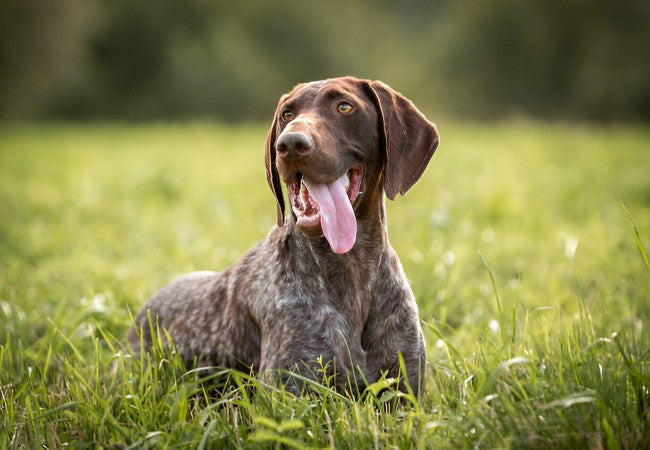German Shorthaired Pointer 2025 Guide: Temperament & Care 🐶

In this article
German Shorthaired Pointer 2025 Guide: Temperament & Care 🐶
By Dr. Duncan Houston BVSc
The German Shorthaired Pointer (GSP) is a dynamic, energetic, and highly versatile hunting dog known for its stamina and intelligence. Whether in the field or at home, GSPs are loyal, affectionate, and eager to work. In this expert 2025 guide, we’ll cover all you need to know about caring for, training, and thriving with this remarkable sporting breed. 🐾
📜 Breed Origins
The GSP was developed in 19th-century Germany by hunters seeking a single, all-purpose field dog. Bred from Spanish Pointers, Bloodhounds, and German hounds, this breed excels in pointing, retrieving, and tracking both on land and in water. 🇩🇪
🧠 Temperament & Personality
GSPs are high-energy, sharp-minded, and people-focused. Expect:
- Energetic: Constant movement—requires active ownership
- Loyal: Bonds deeply with family; loves attention
- Trainable: Responds quickly to positive reinforcement
- Curious: Can be mischievous without structure
🏡 Ideal Home Environment
Best for active families or individuals who enjoy the outdoors:
- Homes with large, secure yards
- Daily exercise access—trails, parks, open fields
- Households with structured routines and engagement
Not suitable for sedentary or indoor-only lifestyles. 🏡
✂️ Coat Type & Grooming
The GSP has a sleek, water-resistant, short coat that’s easy to maintain:
- Brushing: Once weekly with a rubber or bristle brush
- Bathing: Every 6–8 weeks or as needed post-outings
- Ear Cleaning: Weekly—especially after water retrieves
- Nail Trimming: Every 3–4 weeks
🏃♂️ Exercise & Enrichment
This breed needs rigorous, consistent activity:
- 90–120 minutes of high-energy exercise per day
- Running, field work, swimming, or agility sessions
- Interactive toys, scent games, and obedience training
Without exercise, GSPs may become anxious or destructive. 🧠
🍗 Nutrition & Feeding
Support their active metabolism with a high-performance diet:
- Animal protein-based formulas (chicken, duck, or salmon)
- Joint supplements like glucosamine and chondroitin
- Moderate-to-high fat content for energy
Feed twice daily. Customize plans via Ask A Vet. 🍽️
🩺 Common Health Concerns
GSPs are generally healthy but may be prone to:
- Hip Dysplasia: Screen early and monitor mobility
- Bloat (GDV): Split meals and avoid post-meal exercise
- Eye Conditions: Such as entropion or cataracts
- Ear Infections: Check regularly, especially if swimming
Monitor health with Ask A Vet for ongoing care. 🩺
🎓 Training & Socialization
Start training early and make it consistent. Key strategies:
- Crate and leash train by 10 weeks of age
- Use food rewards, clicker training, and structured sessions
- Socialize with people, animals, and various environments
🧘♂️ Emotional Needs
This breed needs family engagement and purpose daily:
- They do not tolerate isolation or neglect well
- Provide jobs (e.g., retrieve, track, or scent detection)
- Offer enrichment toys or challenges when left alone
Behavior support is available at Ask A Vet. 🧠
🏁 Final Thoughts: Is the German Shorthaired Pointer Right for You?
If you're looking for a tireless, affectionate sporting companion who excels in the field and at home, the German Shorthaired Pointer may be your match. With structure, enrichment, and training, GSPs shine as loyal, lifelong partners. ❤️
Need expert support building a GSP care plan? Start a consult now at Ask A Vet!






